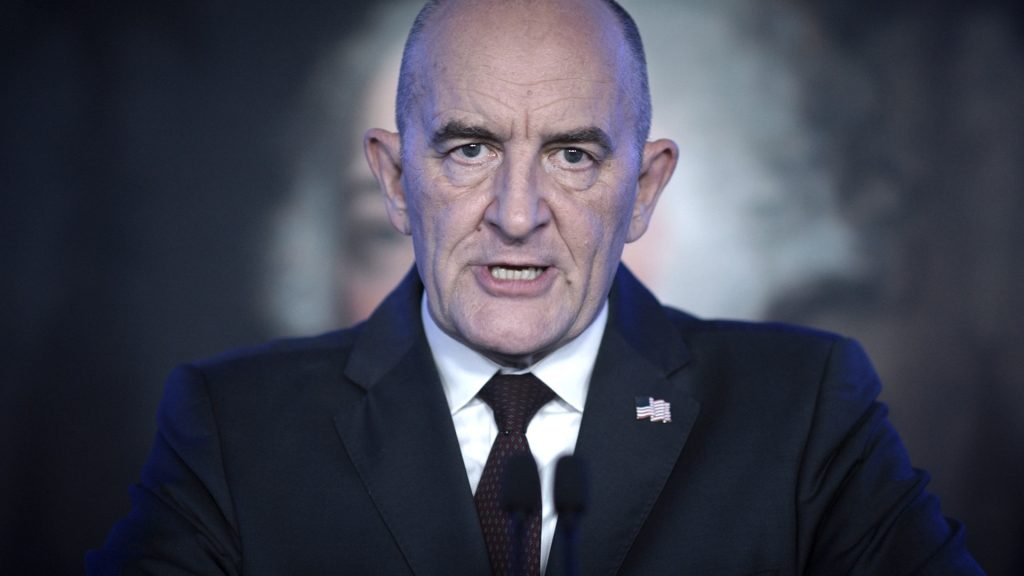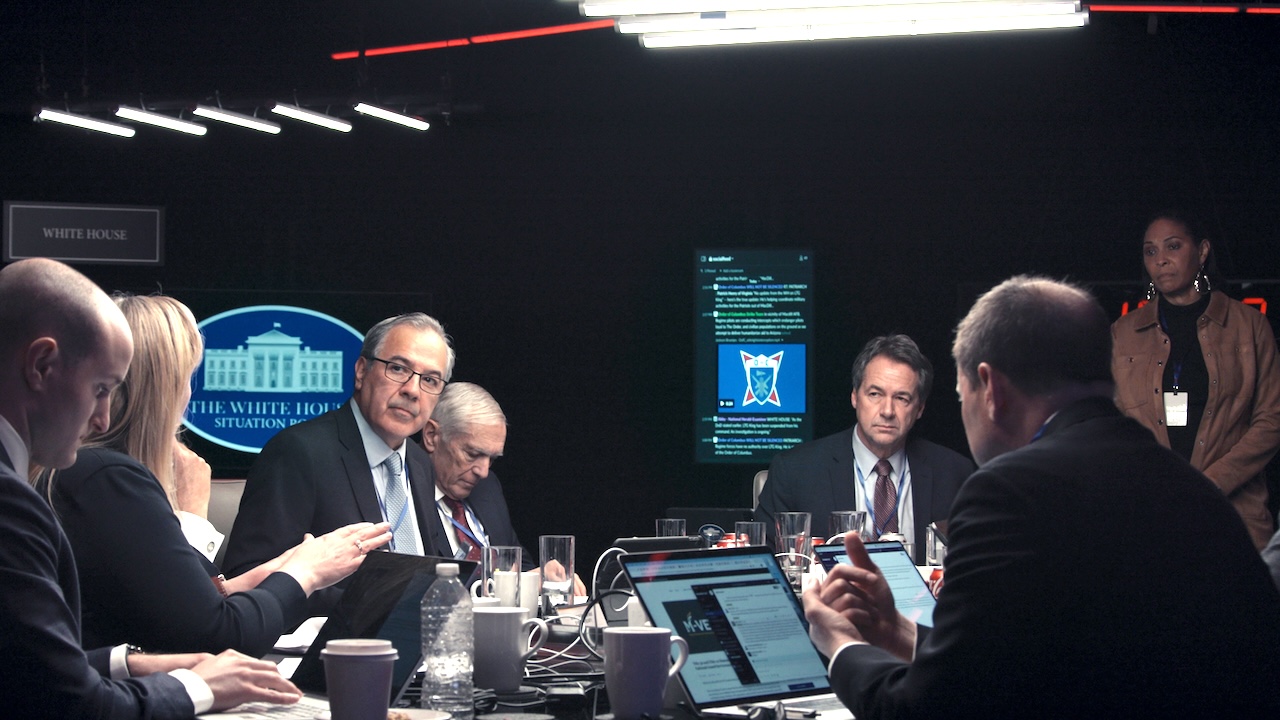War Game is no game. The events of January 6, 2021 were a wake-up call and the time is ripe to evaluate how we might respond to such future threats among increasing political divides.
Described as a simulation of a possible January 6, 2025, War Game unfolds as a hyper-real game based on reality, but equally, removed from it. Tony Gerber and Jesse Moss shared their intentions for this provocative film with Creative Screenwriting Magazine.
The duo carefully considered how their documentary film should be presented for maximum impact. It all began as a “war game” insurrection simulation proposed by Vet Voice in Washington D.C. in response to an Op-Ed in the Washington Post written by three generals to prepare for the 2024 election.
They called on a network of retired military and intelligence officers, and former elected officials to participate. They were equally divided into red, blue, and bi-partisan cells to minimize political bias. All had the same mission – to ensure our democracy survives. It’s “Coup Prevention 101.”

Jesse Moss & Tony Gerber
The film follows a bipartisan group of US defense, intelligence, and elected policymakers spanning five presidential administrations as they participate in an unscripted role-play exercise. The President in War Game is fictitious, but the rogue members of the military are not. There are six hours to block the coup, manage a political crisis, and control the simmering prospect of civil war. The setting would mainly be inside the pressure-cooker environment of the White House Situation Room. The purpose of the film was to identify the weaknesses in the current chain of command and properly prepare for such crises.
“The film cried out to be rendered in a certain way. Both of us felt, if we didn’t capture these ideas and concepts in opposition, fake and real, for example, we were not doing it justice as a straight documentary,” explains Gerber. It’s part cinéma vérité, part political docu-thriller, part dystopian sci-fi that’s taking place in real time with non-actors who are acting.
This was this wonderful opportunity to create something that was fake, yet real, and more real than real – Jesse Moss
Although War Game is based on the events of January 6. 2021, Moss points to a condition called “intentional blindness. We don’t see the most obvious thing, because we can’t deal with it. It’s too traumatic. And this was a way to get at that collective trauma and to make a film about it that processes all of these ideas, not the root cause, but also a remediation,” Moss continues.
“The extraordinary thing is that it goes down easy, but it sticks in people’s chests, and they need to talk. I’ve never seen or worked on a film that worked in this way on its audience,” adds Gerber.
Drawing on other films references was essential in dramatizing the events in War Game in the most compelling manner. “The references that we drew from don’t all fit neatly into a line or a box, but they were all important. They were compass points for us. Obviously, there are reference to Stanley Kubrick’s Dr. Strangelove without the satire,” says Moss. Full Battle Rattle is an earlier film co-directed by Gerber and Moss that covers similar subject matter. The pair also read Coup d’État: A Practical Handbook by Edward Luttwak first published in 1968 for guidance.
“Having so much control, which is rare in documentary, allowed us to elevate the visual language of the film. We had four cameras covering the action around the situation room . We had a production crew of around eighty.”
“We had a remarkable degree of visual control, but also chaos that existed because no movement, no dialogue, no action or outcome could be anticipated. That is a very exciting space to work,” adds Moss.
It comes down to accepting that life is unscripted
The Order Of Columbus
Tony Gerber and Jesse Moss didn’t create the outline of War Game from scratch. They inherited many legacy elements from earlier incarnations of the story. “We wish we had more writing control over, for example, the Order of Columbus and their belief system, their theology so to speak.”
Gerber and Moss created a fake news network and cast Aisha Sasei, a former CNN news anchor. They didn’t write her copy. The game designers controlled the timing, level, and method of threat escalation. They controlled “the name of this insurrectionist movement, the characters in the movement, the name of the failed candidate, and his speech to try to fight and perpetrate the big lie. They were handed to us like lumps of clay that we could then shape.”
As filmmakers, they employed emotional peaks and troughs of the threat escalation in a way to “get the heart rate of our role-players up to engage and terrify the audience.”
The game designers were integral in capturing the unprocessed trauma of J6 and present images and stories to help us make sense of these events. “In discovering that each of these game designers, Alex Thinman, Janessa Goldbeck, Chris Jones, the Marine, went to Afghanistan, they all carry not just the trauma of J6, but the trauma of their lives.”

Lieutenant General Roger Simms (Ralph Brown) Photo by Thorsten Thielow
“Janessa, has a father who’s gone down the QAnon rabbit hole, processing the trauma of a war veteran, or the trauma of Ben Radd who watched a regime fall as a child in Iran, that they are seeking a way to deal with their own trauma by confronting this threat.”
The filmmakers avoided using raw footage of the insurrection. They have become excessively sensationalized and many of us are desensitised to them.
“We set the action in the White House Situation Room. It’s a kind of bureaucratic play. And I love how different in temperature this is going to be. Of course, it gets hot. But it was a way of confronting it, by sidestepping the traumas that we carry. And I think in the way that the theatricality of the exercise functions in the ways that theater has always functioned to provide catharsis.”
The partial aim of War Game is to exorcise some of our internal demons without offering a false sense of control or simplistic hope. There’s a level of complexity in understanding human behavior.
Tone and Pacing
Although the final cut of War Game proceeds at a hurried and urgent clip, it wasn’t always that way. Tony Gerber states that large swathes of the original six-hour, real time cut of the film were dull. He also mentions the essential role of the score in capturing the mood and tone of the film.
“We wanted a piece of music that was tense, anxiety-provoking, but also lyrical. There’s the empathy component, which I believe is healing. In unburdening the traumas of the game designers, we the audience connect and understand that we can all do better.”
“We can defeat this notion of normalcy bias, which is the idea that because the ship of state has always righted itself, it always will. That’s our great undoing. That’s the great danger.” Even if one insurrection was contained, we must remain vigilant.
“In many ways, this film is also about language. Who gets to call themselves a patriot? The idea that these January 6th insurrectionists are patriots. I consider that sacrilegious. That’s deep crime, verbal crime.”
“There was a real claustrophobia to this situation room and we recognized that audience would need to breathe while maintaining the dramatic escalation and tension,” adds Jesse Moss.
“I think it was a real wrestle in the inner room creatively and structurally about when and how we could step out and step away, and how could we do that without undermining the suspension of disbelief that occurs when people invest in these role-players. We had to give the audience a chance to step away, to meet those people, to feel something, and to understand both the political and the personal stakes that motivate this whole endeavor.”
Gerber and Moss also avoided the “metronomic” structure of many documentaries where each scene of similar length and similar structural form.
“There’s no montages in this film. I think the opening ten minutes covers a lot of interesting ground. We also wrestled with how to bring people into this world and what the rules of the world are. What does the audience need to know? What do they not need to know? When can we parse that out?” notes Gerber.
War Game is careful to identify team red and team blue (the cells) without judging them. “Sometimes the empathy goes with the bad guy. When the so-called bad guy is nothing but a two-dimensional cut out, you’re making melodrama. And so much of our political discourse is melodrama. Curiosity has been replaced by judgment. We replace judgment with curiosity,” concludes Gerber. “We go into any project with an openness to being surprised. We did not put our thumb on the scale in any way.”
“In many ways the red cell operatives are the heart and soul of the film. You get to know them out in the world in a way that you don’t necessarily get to know the folks in the blue cell. I typically hear from audiences that they are the most surprised by who the red cell guys are. They’re most surprised by how deeply feeling they are and how committed they are to America.”
